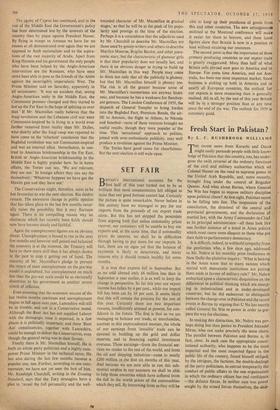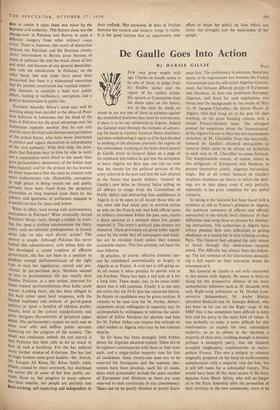Fresh Start in Pakistan?
By L. F. RUSHBROOK WILLIAMS
THE recent news from Karachi and Dacca might easily persuade people with little know- ledge of Pakistan that this country, too, has under- gone the swift reversal of the ordinary functions of the civil and military authorities which set Colonel Nasser on the road to supreme power in the United Arab Republic, and, more recently, brought Iraq under the control of Brigadier Qassim. And what about Burma, where General Ne Win has begun to impose military discipline upon political chaos? At first sight, Pakistan seems to be falling into line. The suspension of the constitution, the dismissal of the central and provincial governments, and the declaration of martial law, with the Army Commander-in-Chief as its principal administrator—all these look like one further instance of a trend in Asian politics which must cause some disquiet to those who pin their faith to parliamentary democracy.
It is difficult, indeed, to withhold sympathy from the gentleman who, a few days ago, addressed to Mr. Nehru at his monthly press Conference in New Delhi the plaintive inquiry: 'What is lacking in the Asian scene that so many nations which started with democratic institutions are putting them aside in favour of military rule?' Mr. Nehru embarked upon a characteristic disquisition on the differences in political thinking which are emerg- ing in industrialised and in under-developed countries; but he did endeavour to distinguish between the change-over in Pakistan and the recent events in Burma by arguing that U Nu has merely called General Ne Win to power in order to pre- pare the way for elections.
In making this distinction, Mr. Nehru was per- haps doing less than justice to President Iskander Mirza, who can make precisely the same claim. The parallel between Pakistan and Burma is, in fact, close. In each case the appropriate consti- tutional authority, who happens to be the most impartial and the most respected figure in the public life of the country, found himself obliged, by the intrigues, the factions, the double-dealings of the party politicians, to entrust temporarily the conduct of public affairs to the one organisation in which the ordinary citizen has real confidence —the defence forces. In neither case was power sought by the armed forces themselves; the deck Sion to confer it upon them was taken by the Supreme civil authority. This feature alone sets the change-over in Pakistan and Burma in quite a different category from other military coups d'etat. There is, however, this much of distinction between the Pakistani and the Burmese events; Army intervention in Burma arose because of chaos in political life and the break-down of law and order, not because of any general dissatisfac- tion with the constitution. In Pakistan, on the other hand, law and order have never been threatened; but there is a widespread conviction that the present constitution has enabled undesir- able elements to establish a hold over public affairs, leading to inefficiency, corruption, and a general deterioration in public life.
President Iskander Mirza's mind may well be Working along lines parallel to the ideas of Presi- dent Sukarno in Indonesia; but the head of the State in Pakistan has the great advantage over his Indonesian opposite number that he can rely entirely upon the loyal and disinterested patriotism of the armed forces, who have never intervened in politics and regard themselves as subordinates of the civil authority. With their help, the pros- pects that Pakistan may in time be able to work out a constitution more fitted to her needs than Pure parliamentary democracy of the Indian type seem hopeful; and for the present she has learned by bitter experience that she must be content with more authoritarian rule. Meanwhile, corruption in high places is being rooted out and public servants have been freed from the perpetual frustration so long imposed upon them by the jobbery and ignorance of politicians engaged in a sordid rat-race for place and power.
What, in effect, went wrong with parliamentary institutions in Pakistan? What eventually forced President Mirza—who, though a soldier by train- ing, has been a civilian administrator for thirty Years, with no inherent predisposition to favour army rule—to take such drastic action? The answer is simple. Although Pakistan has never lacked able administrators, with whose help she has developed a sound tradition of efficient government, she has not been in a position to Produce enough parliamentarians of the right type to man her legislatures, central and pro- vincial. In pre-partition days, Muslims seemed to take to parliamentary life less readily than Hindus. Pakistan, as a new nation, inherited far fewer trained parliamentarians than India could Muster. Lacking them, she has been obliged to fall back either upon local magnates, with the limited traditions and outlook of parish-pump Miles, or upon a handful of old-time profes- sionals, bred to the cynical manipulations and Party intrigues characteristic of perpetual oppo- Sidon. The parliamentary system set such men as these over able and selfless public servants labouring for the progress of the country. The result was confusion; indeed, the real marvel is that Pakistan has been able to do so much in face of such a handicap. For she has suffered many further strokes of ill-fortune. She has lost in tragic fashion some great leaders—Mr. Jinnah, Mr. Liaquat Ali Khan, Dr. Khan Sahib; while illness, caused by sheer overwork, has shortened the active life of some of her best public ser- vants. Even so, her progress in many spheres has been notable; her people are patriotic and Lard-working, self-respecting and independent in their outlook. Her economy, in spite of friction between her eastern and western wings, is viable. It is her good fortune that an opportunity now offers to shape her policy on lines which suit better the strengths and the weaknesses of her people.



































 Previous page
Previous page